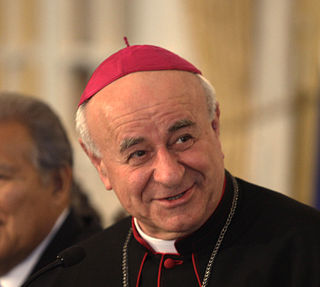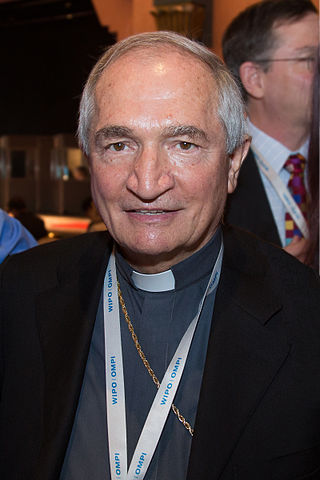The Roman Curia comprises the administrative institutions of the Holy See and the central body through which the affairs of the Roman Catholic Church are conducted. The Roman Curia is the institution which the Roman Pontiff ordinarily makes use of in the exercise of his supreme pastoral office and universal mission in the world: thus curialism refers traditionally to an emphasis on the supreme authority of the Holy See within the Catholic Church. It is at the service of the Pope and bishops, fulfilling their function with an evangelical spirit, working for the good and at the service of communion, unity and edification of the Universal Church and attending to the demands of the world in which the Church is called to fulfill its duty and mission.

The Dicastery for the Doctrine of the Faith (DDF) is a department of the Roman Curia in charge of the religious discipline of the Catholic Church. The Dicastery is the oldest among the departments of the Roman Curia. Its seat is the Palace of the Holy Office in Rome. It was founded to defend the Catholic Church from heresy and is the body responsible for promulgating and defending Catholic doctrine.

Vincenzo Paglia is an Italian prelate of the Catholic Church. He is the president of the Pontifical Academy for Life and grand chancellor of the John Paul II Pontifical Theological Institute for Marriage and Family Sciences.
The International Theological Commission (ITC) is a body of the Roman Curia of the Catholic Church; it advises the magisterium of the church, particularly the Dicastery for the Doctrine of the Faith (DDF), a dicastery of the Roman Curia. Its memberships consists of no more than 30 Catholic theologians appointed by the pope at the suggestion of the prefect of the DDF for renewable five year terms. They tend to meet annually for a week in Rome, where the commission is based.
Pastor bonus is an apostolic constitution promulgated by Pope John Paul II on 28 June 1988. It instituted a number of reforms in the process of running the central government of the Catholic Church.

Willem Jacobus "Wim" Eijk is a Dutch prelate of the Catholic Church, a cardinal since 2012. He has been the Metropolitan Archbishop of Utrecht since 2007. He was Bishop of Groningen-Leeuwarden from 1999 to 2007. Before his clerical career he worked as a doctor; as a priest he made medical ethics the focus of his academic studies.

Silvano Maria Tomasi C.S. is an Italian prelate of the Catholic Church who has served as the Special Delegate to the Sovereign Military Order of Malta since 1 November 2020. He was the Permanent Observer of the Holy See to the United Nations in Geneva from 2003 to 2016. He previously worked in the Roman Curia, became an archbishop in 1996, and represented the Holy See as an apostolic nuncio in Africa from 1996 to 2003.
The position of the Catholic Church on capital punishment has varied throughout history, with the Church becoming significantly more critical of the practice since the early to mid-20th century. In 2018, the Catechism of the Catholic Church was revised to read that "in the light of the Gospel" the death penalty is "inadmissible because it is an attack on the inviolability and dignity of the person" and that the Catholic Church "works with determination for its abolition worldwide."
The Dicastery for the Laity, Family and Life is a dicastery of the Roman Curia. Pope Francis announced its creation on 15 August 2016, effective 1 September 2016. It took over the functions and responsibilities of the Pontifical Council for the Laity and the Pontifical Council for the Family. It has responsibility "for the promotion of the life and apostolate of the lay faithful, for the pastoral care of the family and its mission according to God's plan and for the protection and support of human life."
The Dicastery for Promoting Integral Human Development is a dicastery of the Roman curia.

Víctor Manuel "Tucho" Fernández is an Argentine prelate of the Catholic Church and a theologian. He is currently the head of the Dicastery for the Doctrine of the Faith.

Pope Francis, the head of the Catholic Church since 2013, has adopted a significantly more accommodating tone on LGBT topics than his predecessors. In July 2013, his televised "Who am I to judge?" statement was widely reported in the international press, becoming one of his most famous statements on LGBT people. In other public statements, Francis has emphasised the need to accept, welcome, and accompany LGBT people, including LGBT children, and has denounced laws criminalising homosexuality. While he has reiterated traditional Catholic teaching that marriage is between a man and a woman, he has supported same-sex civil unions as legal protections for same-sex couples. Under his pontificate, the Dicastery for the Doctrine of the Faith has confirmed that transgender people can be baptised, and allowed the blessing of same-sex couples in the document Fiducia supplicans. Francis has privately met many LGBT people and activists. In 2013, Francis was named as Person of the Year by The Advocate, an American LGBT magazine.
Vos estis lux mundi is a motu proprio by Pope Francis, promulgated on 9 May 2019. It establishes new procedural norms to combat sexual abuse and ensure that bishops and religious superiors are held accountable for their actions. It establishes universal norms, which apply to the whole church. As an experiment, the norms entered into force for a period of three years, starting on 1 June 2019. The norms were then expanded and made permanent on 25 March 2023, with their coming into force on 30 April 2023.
Praedicate evangelium is an apostolic constitution reforming the Roman Curia and was published and promulgated on 19 March 2022 by Pope Francis; the document took effect on 5 June 2022.
Events in the year 2022 in Vatican City.
María Lía Zervino is an Argentinian consecrated virgin and a sociologist. Being a member of the Asociación de Vírgenes Consagradas Servidoras she served as President General of the World Union of Catholic Women's Organisations from 2018 to 2023, an Association of the Christian faithful which was erected by the Holy See in 2006.
Events in the year 2021 in Vatican City.
Events in the year 2023 in Vatican City.
Fiducia supplicans is a 2023 declaration on Catholic doctrine that allows Catholic priests to bless couples who are not considered to be married according to church teaching, including same-sex couples. Subtitled "On the Pastoral Meaning of Blessings", the document is dated 18 December 2023 and was released on the same day. Fiducia supplicans was issued by the Holy See's Dicastery for the Doctrine of the Faith (DDF) and approved with a signature by Pope Francis. It was the first declaration issued by the DDF since Dominus Iesus in 2000.
Events in the year 2019 in Vatican City.







